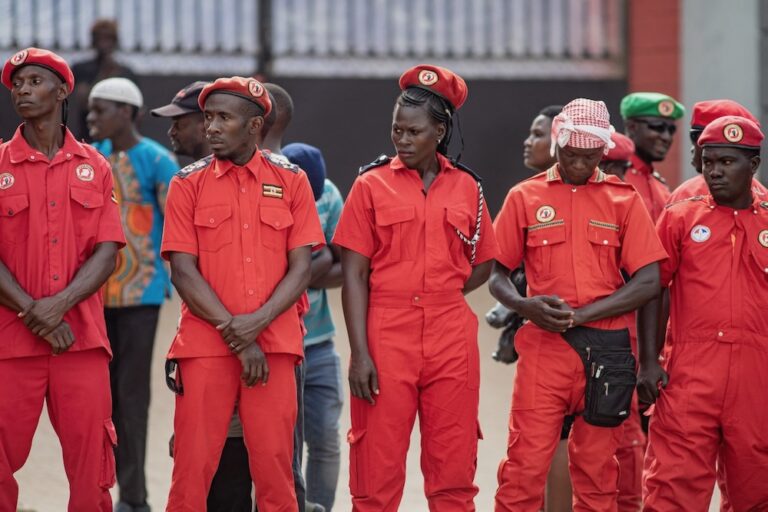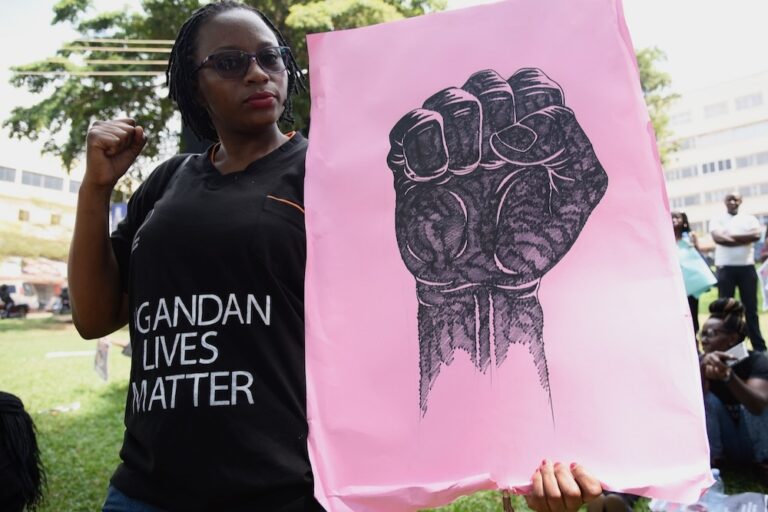It is over 120 days since the government pledged to implement 170 recommendations in the area of human rights during the review at the Universal Periodic Review in Geneva in October 2011, but Uganda still falls well short of implementation.
(HRNJ-Uganda/IFEX) – Kampala, 12 March 2012 – It is over 120 days since the Ugandan government voluntarily accepted and pledged to implement 170 recommendations in the area of human rights during the review at the Universal Periodic Review Mechanism (UPRM) in Geneva in October 2011, but Uganda still falls short of implementation.
The Ugandan mission to Geneva was headed by the Ministry of Internal Affairs for the 11 October 2011 review. Of the 170 recommendations, nothing has been done or put in place so far to start improving the human rights situation in the country.
The government, particularly in the area of press freedom, pledged to investigate acts of violence meted out against journalists and bring errant law enforcement officers to book, repeal and amend all laws that contravene the constitution and international Conventions and treaties, among others, but not a single government committee or departments has been set-up to undertake these special assignments either in the police or parliament.
Human Rights Network for Journalists-Uganda (HRNJ-Uganda) notes with concern that the government has continued to sideline civil society organizations in the UPRM process as a way to front ill-represented interests from the period of validation of a national report to the pre-adoption process, where final decisions on the reserved recommendations has been decided on by a few individuals in government. This has been done with no consultations or substantive engagements with the various stakeholders.
Ugandans have not only remained largely ignorant of their rights and freedoms but also the UPRM process. This action clearly shows how the government aims at keeping citizens less empowered in order not to demand what they are entitled to in regard to this process.
Although we have heard that that government has drafted terms of reference for a consultant who is expected to be hired to develop a National Action Plan for UPRM, the time frame within which to realize such an initiative is still unknown.
The Ugandan government has continued its onslaught on the work of the United Nations Special Rapporteur on Freedom of Expression, when it roundly rejected recommendations to admit him into the country. Recommendations came particularly from Canada and Latvia, among others. The Ugandan government for years has turned a deaf ear to numerous requests by the same office to be admitted, in order to assess the enjoyment of such freedoms.
The voices of reason and freedom of the press continue to shrink, political activists are silenced and their activities are brutally dispersed by the police and other security agencies.
Uganda has dropped 43 places, to 139th position out of 170 countries in the world that were assessed by international body Reporters Without Borders. A recent human rights report, the Press Freedom Index (PFI), released by a local journalists’ human rights body summed up the press freedom situation as deteriorating due to increasing attacks on journalists and the high level of impunity enjoyed by the perpetrators, who are mainly security agents.
The working environment for Non-Government Organizations (NGO) is becoming frail, and rights and freedoms including the right to privacy are being clamped down with impunity despite the country facing international scrutiny.
“The UPRM process should be for all Ugandans and not a preserve of a few people who are again in control and managing country resources and drafting policies and laws. The process is intended to improve the human rights situation for all Ugandans despite the fact that the government is reporting to the United Nations Human Rights Council. It is the responsibility of government to ensure that all rights and freedoms are fully enjoyed. Uganda should be mindful of examples it is setting as a member of the human rights council of the United Nations,” noted HRNJ-Uganda Programme Coordinator Wokulira Ssebaggala.
He stressed the importance of exerting more pressure on the government to accept all recommendations that were put to it, because they are expected to improve the enjoyment of rights and freedoms in the country. HRNJ-Uganda calls upon UN member states to remind the Ugandan government of its obligation of upholding human rights and undertake an all-inclusive approach to involve CSOs and citizens in this process, as a way of improving the general human rights situation in the country.


